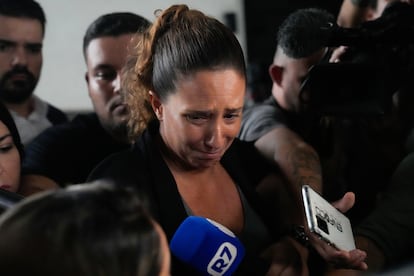Brazilian police arrest suspected masterminds behind the killing of councilwoman-turned-icon
The brutal assassination of Marielle Franco, a 38-year-old Black, bisexual Rio de Janeiro city councilwoman in a drive-by shooting, shook Brazil profoundly and reverberated across the world

Brazil’s federal police arrested on Sunday the men suspected of ordering the killing of a Rio de Janeiro councilwoman in 2018, a long-awaited step after years of society clamoring for justice.
The brutal assassination of Marielle Franco, a 38-year-old Black, bisexual Rio de Janeiro city councilwoman in a drive-by shooting, shook Brazil profoundly and reverberated across the world.
Two federal police sources with knowledge of the investigation told The Associated Press that congressman Chiquinho Brazão and his brother Domingos Brazão, a member of Rio state’s accounts watchdog, were detained on suspicion of ordering the hit against Franco. Both have alleged connections to criminal groups, known as militias, who illegally charge residents for various services, including protection.
The sources didn’t make clear what their suspected motive was.
On Wednesday, Brazil’s Justice Minister Ricardo Lewandowski said the country’s Supreme Court had validated a plea bargain for the shooter who was arrested along with the driver in 2019.
The investigation into Franco’s murder had been troubled for years. Rio’s state civil police couldn’t break the case after the arrest and indictment of the shooter and the driver. The lead detectives were changed four times until February 2023, when federal authorities took control.
The driver admitted to the double murder of Franco and her driver in 2023. The shooter, disgraced former police officer Ronnie Lessa, signed a plea bargain deal with authorities in January and his admission led to Sunday’s arrests.
Rivaldo Barbosa, the head of Rio’s police when the murder took place, was also arrested for alleged obstruction of the investigation, the sources said.
Franco, the councilwoman, worked as an assistant to then-state lawmaker Marcelo Freixo in 2008, as he presided over a special committee investigating militias in Rio’s state assembly. Freixo’s final report indicted 226 suspected militia members and politicians and government employees, including Domingos Brazão. While Brazão was mentioned in the report, he wasn’t indicted.
Political violence isn’t uncommon in Rio, and such killings are often linked to territorial and political disputes. But they typically go unsolved and never elicit the same level of outcry as Marielle’s death did. She had been a rising political star, making her name by exposing police abuse and violence against residents of working-class neighborhoods known as favelas.
Known universally by her first name, Marielle grew up in a favela herself, the Mare neighborhood near Rio’s international airport. She became a human rights activist there after her friend was killed by a stray bullet in a shootout between police and drug traffickers. She worked for Freixo, investigating organized crime, then went on to win a seat in Rio’s city council in 2016. She kept receiving and sharing complaints of police abuse until days before she was killed.
She stood out as one of the only Black women on the council and, while her assertiveness and mere presence ruffled some, she remained unbowed.
“Why did they choose Marielle? No doubt it was because she is a Black woman, they were sure they would go unpunished,” Freixo said on X, formerly Twitter. He wrote that crowds gathered a day after her murder to mourn her and those who killed her were not able to see “the greatness of what Marielle stood for.”
On the evening of March 14, 2018, she left an event to empower young Black women when a car pulled up alongside hers and opened fire. Marielle and her driver, Anderson Gomes, were killed on-site.
The brutality of the slaying and the political hope she had embodied transformed her into a symbol of left-wing resistance in Brazil and abroad: People staged massive protests to channel their outrage; her silhouette was painted on walls across Brazil and printed on T-shirts; her name figures on a street sign in front of Rio’s city council; a public garden in Paris is named for her; and her sister, Anielle Franco, has been appointed Brazil’s minister of racial equality.
Anielle said Sunday on social media the arrests were an emotional moment and that they gave an answer “to favela residents who voted for Marielle, for women who put their bodies at the service of politics.”
The Brazão brothers’ political clan is associated with an area of the city historically dominated by militias — groups initially made up mainly of former policemen and off-duty officers who wanted to combat lawlessness in their neighborhoods with armed force. They began to extort shop owners and charge for services such as internet, cooking gas and cable TV. More recently, they have expanded their illicit businesses into land grabbing and real estate development.
Militias now control more than half the territory in Rio’s metro region, according to a 2022 study from the Federal Fluminense University and the Fogo Cruzado Institute.
Sign up for our weekly newsletter to get more English-language news coverage from EL PAÍS USA Edition
Tu suscripción se está usando en otro dispositivo
¿Quieres añadir otro usuario a tu suscripción?
Si continúas leyendo en este dispositivo, no se podrá leer en el otro.
FlechaTu suscripción se está usando en otro dispositivo y solo puedes acceder a EL PAÍS desde un dispositivo a la vez.
Si quieres compartir tu cuenta, cambia tu suscripción a la modalidad Premium, así podrás añadir otro usuario. Cada uno accederá con su propia cuenta de email, lo que os permitirá personalizar vuestra experiencia en EL PAÍS.
¿Tienes una suscripción de empresa? Accede aquí para contratar más cuentas.
En el caso de no saber quién está usando tu cuenta, te recomendamos cambiar tu contraseña aquí.
Si decides continuar compartiendo tu cuenta, este mensaje se mostrará en tu dispositivo y en el de la otra persona que está usando tu cuenta de forma indefinida, afectando a tu experiencia de lectura. Puedes consultar aquí los términos y condiciones de la suscripción digital.








































